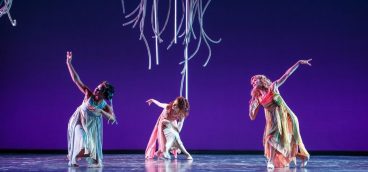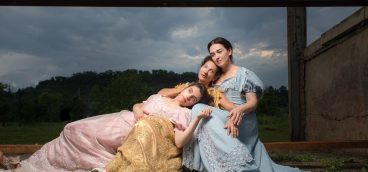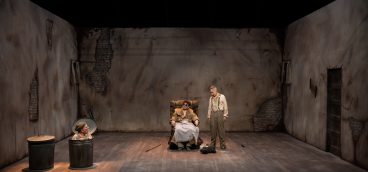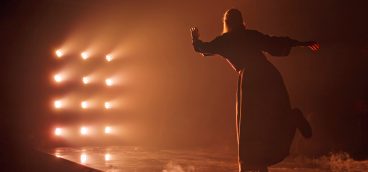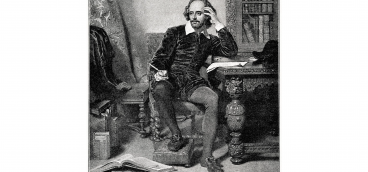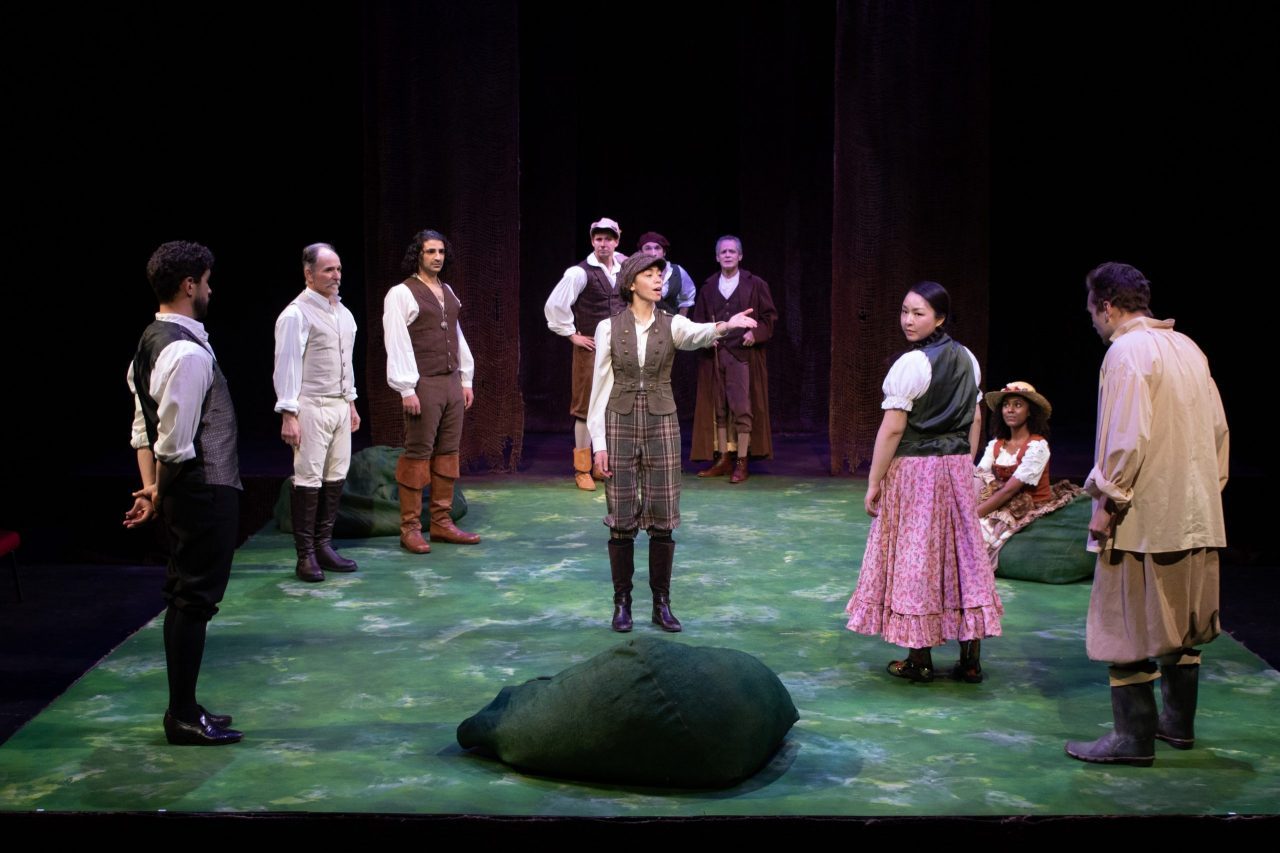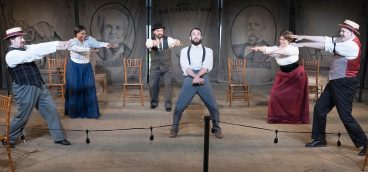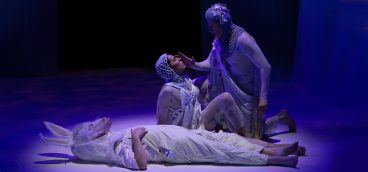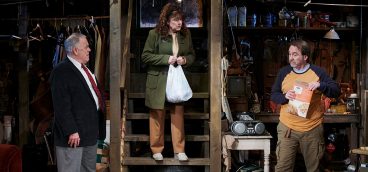Pitt Stages’ “Seven Guitars” Gives Life to a Dream Deferred
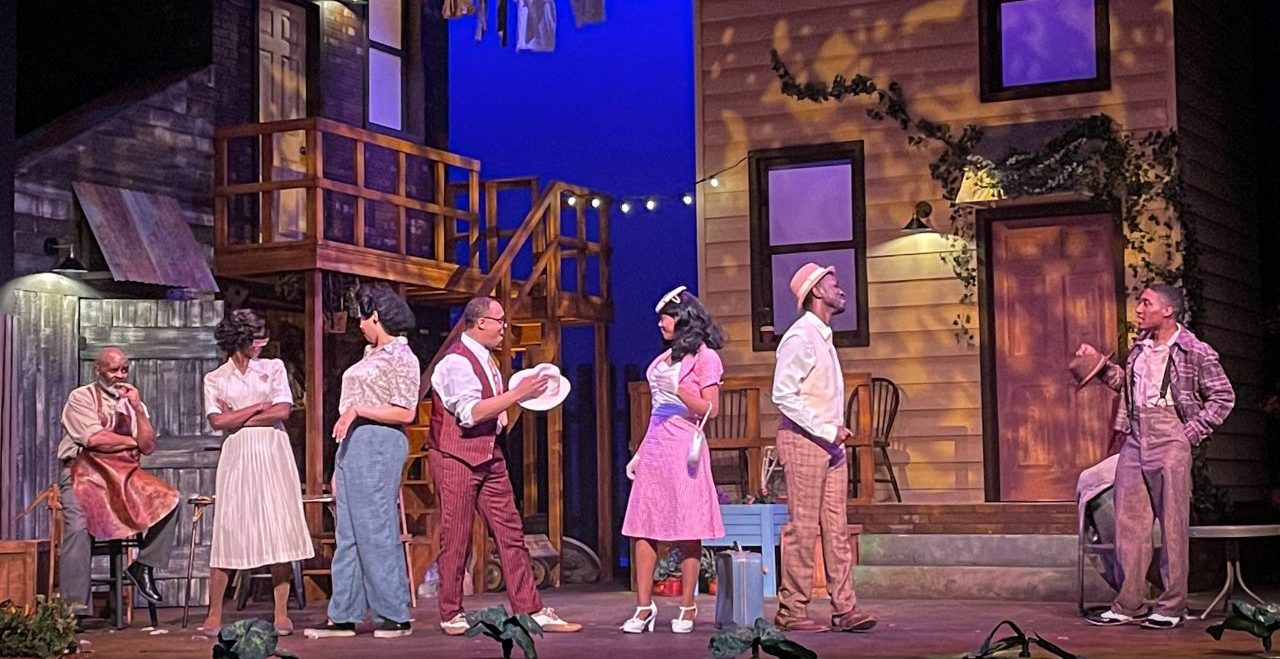
It has been said that the sign of great actors is that they don’t care if you watch them perform or not – as they disdain “playing to the crowd” — and I would argue that the same can be said of great playwrights, who write in a way that invites you to listen to them without demanding your attention. I came away from Pitt Stages’ production of August Wilson’s “Seven Guitars” (1995) mediating on this thought, transformed as I was after witnessing the quiet assurance of a master dramatist deliver a two-and-a-half hour emotional journey through his pen, that felt more like listening to the old porch stories of the adults in my neighborhood as a kid, than attending a formal theatrical production on a big stage with hundreds of onlookers.
It’s not that this is a quiet play, or a subtle play, or an uneventful play – there is dancing and music and shouting and even a murder – but it’s really a play about conversation, the kind of conversation that can only occur when people, or in this case characters, really listen to each other. It’s what your drama-school teacher always told you to do, but playwrights don’t make this easy, lacing their scripts with hyperbole, over-reaching symbolism, and often dismal attempts at lyrical profundity. What a tremendous pleasure it is to watch the results of a writer who actually knows how to evoke the way people speak, and then lets them actually speak to each other, rather than to an anonymous fourth wall of the stage.
That “Seven Guitars” may not be the strongest of all of Wilson’s plays is kind of like saying that “Macbeth” isn’t the strongest of Shakespeare’s plays. It’s a matter of absolute, not relative accomplishment. Look at the unparalleled body of work. This is Wilson’s fifth installment, chronologically, of his ten-part “Pittsburgh Cycle,” focused on the African-American experience in the twentieth century, and set right at the middle, in 1948. One of the advantages of composing this review in Pittsburgh is that I don’t have to tell you about its Hill District locale, as well as all that David Copperfield kind of stuff regarding our city. Ironically, we were told how to watch this play by Mayor Ed Gainey, who jumped up on stage before the performance and admonished the audience to use “not just eyesight, but insight” which, had it not been spoken by a politician, would appear to be the glaringly tautological. But any political support of the theater I will accept most salubriously — just ask the dramatists of the English Restoration.
In this production, scenic designer Kensey “MadamQueen” Coleman has created a set that has a somber ambience — even the daytime scenes feel crepuscular — comprising a two-story backyard complex of porches, stairs, doorways and windows that coalesce into a kind of rough garden, with a table, chairs, and various tools. We have a “Rear Window” view into these lives; it’s like watching a small world through the glass of a terrarium: people may enter and exit, but it’s entirely dualistic: nothing flows through by accident. You’re either in or out.
The story, told in flash-back form between the bookends of a funeral for Floyd “Schoolboy” Barton, recounts the experiences of six people drawn to Barton, who is a one-hit-wonder blues guitarist on the verge of making it big in Chicago. Each in a way shares his dream of escape, whether literally or vicariously, and the question is asked, existentially, not what we should dream, or how we should dream, but more darkly, whether it’s safe to dream in this America of racial prejudice and degradation. It’s not so important that Wilson answers this question for us, but that he has the courage to present it with such depth and passion that is truly impressive.
Barton is a classic Orpheus figure, and the play has similarities to Tennessee Williams’ “Orpheus Descending” (1957), the mythos of which was in the air during the gestational period of “Seven Guitars,” as a revival of it ran on Broadway in 1989, and then was made into a film the following year. As portrayed by K.P. Powell, he’s an ebullient, irrepressible character who seems to be fueled by the attention of women as much as he is by music, but small obstacles always manage to impede him, like getting his guitar out of the pawn shop so he can begin to record again, and fulfill his destiny.
His friends Canewell (Christopher Collier), and Red Carter (Tru Verret-Fleming, whom you may remember from his moving performance in Pitt Stages’ “Parade” in 2017), are also characters fully formed, which gives this production such a lived-in, mature, and interpretive feel, rare for a college show. But I have always held that college theater is often some of the best theater, the levels of risk and reward being so blissfully explored without many of the pressures and constraints of commercial shows.
Balancing these extroverted men are two demure women, Vera (Mariam Ahmed) — Barton’s love interest — and Ruby (Micah Williams), who appears at the end of the first act to escape her small-town troubles and start a new life. It’s not that Wilson’s female characters are any less eloquent than the male ones, but rather, when they listen they truly absorb what they’re hearing, a trait the men often lack.
Louise (Miya Gaines) and Hedley (Wali Jamal) are the two anomalous souls actually rooted to the physical location of the setting: they live there and don’t need to escape, although Hedley is the biggest dreamer of them all. He’s also the oldest at 59, but more important, a heavy drinker and susceptible to apocalyptic delusions — not a good mix, especially in a Wilson drama.
Director KJ Gilmer (who also designed the vibrant period costumes) brings this all together in a way that honors the playwright’s bleak realism as well as his unpretentious lyricism, keeping the runtime to a taut two-and-a-half hours, after what must have been some judicious editing, as the original version ran for four hours, and often is performed in three.
There is brilliance in this kind of directing as so much is achieved with so little action; we are hearing words and speeches and songs, but time is not slowed by the usual monotony of language; rather, the vocalizations are processed by the viewer emotionally instead of incrementally, much as music is better absorbed by the body than by the brain. Directing is kind of like drumming: if you don’t have a good drummer, you won’t have a good band.
The only impingements on this process — and they are minor — are the occasional heavy-handedness of some of the technical aspects. Krishna Amin’s sound designs — comprising roosters, barking dogs, hammers and tools, crickets, etc. — become a bit intrusive and compete with the dialogue at certain times. Likewise, Elizabeth Amstutz seems to have graduated from the Fellini school of sudden lighting changes. There are moments when the stage brightens abrasively to signal a time change, like the famous moment in the La Dolce Vita when dawn falls like a sledgehammer upon the Trevi Fountain.
Coleman’s set makes an effective platform for what is in essence a kind of Greek tragedy — there are just enough props and embellishments for the actors to utilize without distracting them — but I could not find any justification for the bifurcation of realism and abstraction in the fenestration, for example, and the placement of three railroad-style spot lights aimed directly at the audience which became an annoyance, at least where I was sitting.
But taken as a whole, this is first-rate drama, well-acted and delivered with the kind of nuanced but nonchalant genuineness that a playwright of Wilson’s artistry demands. I left the theater imbued with that wonderful dichotomy of being absolutely fulfilled, but desiring more, as if I wanted to hear another story like the one I had just witnessed, even though I knew that it was late, and all the raconteurs had left the porch. But I could replay this one in my mind with sublime pleasure, again and again.
# # #
“SEVEN GUITARS” continues through February 26th at the Charity Randall Theater in Oakland, $17 – $27. www.play.pitt.edu/production/august-wilsons-seven-guitars


